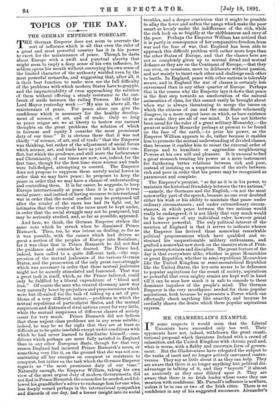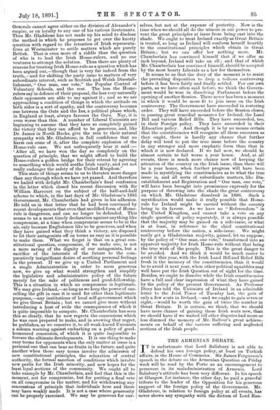MR. CHAMBERLAIN'S EXAMPLE.
IN some respects it would seem that the Liberal Unionists have succeeded only too well. Their opponents have not, indeed, withdrawn the great consti- tutional proposal which threatens Ireland with a crowd of calamities, and the United Kingdom with chronic peril and, what is worse, with a flabby and uncertain form of govern- ment. But the Gladstonians have relegated the subject to the ranks of inert and no longer actively canvassed contro- versies. They say as little about it as they can help. They are aware that there is no longer anything but political dis- advantage in talking of it, and they " boycott" it almost as anxiously as they once dilated upon it. They are aware that there is no Irish leader whose name they can mention with confidence. Mr. Parnell's influence is nowhere, unless it be in one or two of the Irish cities. There is no confidence in any of his suggested successors. Alexander's Generals cannot agree either on the division of Alexander's empire, or on loyalty to any one of his various lieutenants. Then Mr. Gladstone has not made up his mind to disclose the method in which he proposes to get over the knotty question with regard to the retention of Irish representa- tives at Westminster to settle matters which are purely British. That is even more of a riddle than the question of who is to lead the Irish Home-rulers, and no one ventures to attempt the solution. Thus there are plenty of reasons for treating Irish Home-rule as a question which has been argued out,—though that is very far indeed from the truth,—and for shifting the party issue to matters of very subordinate interest, such as Scottish and Welsh Disestab- lishment, " One man, one vote," the Popular Control of Voluntary Schools, and the rest. The less the Home- rulers say in defence of their proposal, the less very naturally their opponents are able to say against it ; and so we are approaching a condition of things in which the attitude on both sides is a sort of apathy, and the controversy becomes one between the Outs and the Ins, a political phase which, in England at least, always favours the Outs. Nay, it is even worse than this. A number of Liberal Unionists are beginning to assume that they have so completely gained the victory that they can afford to be generous, and, like Dr. James in North Bucks, give the rein to their natural sympathy with Mr. Gladstone, in full confidence that no harm can come of it, after the complete explosion of the Home-rule case. We not unfrequently hear it said After all, we have won the day so completely on the question of principle, that we might afford to build the Home-rulers a golden bridge for their retreat by agreeing to something which would soothe Irish vanity, and yet not really endanger the safety of the United Kingdom.' This state of things seems to us to threaten more danger than any through which we have yet passed. And therefore we hailed with delight Mr. Chamberlain's final confession in the letter which closed his recent discussion with Sir William Harcourt on the subject of the half-and-half scheme to which, in the last days of Mr. Gladstone's 1885 Government, Mr. Chamberlain had given in his adhesion. He told us in that letter that he had been convinced by recent developments that even that modified form of Home- rule is dangerous, and can no longer be defended. This seems to us a most timely declaration against anything like compromise, at a time when compromise seems to be in the air, only because Englishmen like to be generous, and when they have gained what they think a victory, are disposed to let their antagonists off on terms as easy as it is possible to make them. What we forget is that on a great con- stitutional question, compromise, if we make one, is not a mere saving of the dignity of our antagonists, but a sacrifice of the interests of the future to the com- paratively insignificant desire of soothing personal feelings in the present. If we give up a United Parliament and a single Administration in order to seem generous now, we give up what would strengthen and simplify the legislative and administrative policy of the future merely for the sake of politeness and good-fellowship. This is a situation in which no compromise is legitimate. We may give Ireland,—so long as we keep the power of can- celling the gift in case it is used for other than legitimate purposes,—any institutions of local self-government which we give Great Britain ; but we cannot give more without introducing a host of evils the consequences of which it is quite impossible to compute. Mr. Chamberlain has seen this so clearly, that he now regrets the concessions which he was once prepared to make, and in avowing that regret, he publishes, as we conceive it, to all weak-kneed Unionists a solemn warning against embarking on a policy of good- humoured concession, of which it is quite impossible to foresee the ultimate developments. It is one thing to make easy terms for opponents when the only matter at issue is a personal one that can bear no fruits in the future, and quite another when those easy terms involve the admission of new constitutional principles, the relaxation of central authority, the formal sanction of conditions which involve new perils for the Irish minority, and new hopes for the least loyal sections of the community. We ought all to take example by Mr. Chamberlain, and feel that this is the moment, not for compromise, but for putting a final veto on all compromise in the matter, and for withdrawing any concessions of principle that individuals here and there may have weakly made. It is not a case where generosity can be properly exercised. We may be generous for our- selves, but not at the expense of posterity. Now is the time when we should all do the utmost in our power to pre- vent the great principles at issue from being cast into the shade. We ought to treat Ireland exactly as Great Britain is treated, so long as Ireland will conform herself heartily to the constitutional principles which obtain in Great Britain ; but we can offer her nothing more. Mr. Chamberlain has convinced himself that if we offer an inch beyond, Ireland will take an ell ; and that of which Mr. Chamberlain has convinced himself, should be accepted by the most hearty Liberals as a law for themselves. It seems to us that the duty of the moment is to resist the prevailing disposition to drop a tedious controversy before it has been fairly and finally settled. For our own parts, as we have often said before, we think the Govern- ment would be wise in dissolving Parliament before the opening of another Session. There never has been a moment in which it would be more fit to join issue on the Irish controversy. The Government have succeeded in restoring order. They will have succeeded before the Session closes, in passing great remedial measures for Ireland, the Land Bill and various Relief Bills. They have succeeded, too, in their Foreign policy. They have succeeded in their Education policy. And though it is by no means certain that the constituencies will recognise all these successes as they ought, there is hardly any chance that further delay will tend to put the true issue before the country in any stronger and more emphatic form than that in which it is now declared. If we fail now, we should be almost certain to fail worse a year hence. And, at all events, there is much more chance now of keeping the attention of the country on the Irish issue, than there will be a year hence, when further progress will have been made in mystifying the constituencies as to what the true issue is, and all sorts of subordinate matters, like Dig- establishment and Registration and " One man, one vote," will have been brought into prominence expressly for the purpose of throwing into the shade the great controversy on which Mr. Gladstone dissolved in 1886. Such a mystification would make it really possible that Home- rule for Ireland might be carried without the country being in its favour. As we have no " Referendum " in the United Kingdom, and cannot take a vote on any single question of policy separately, it is always possible that the majority may be gained on a side-issue, or what is at least, in reference to the chief constitutional controversy before the nation, a side-issue. We might easily get a Gladstonian majority, gained, let us suppose, by the policy of " One man, one vote," transformed into an apparent majority for Irish Home-rule without that being the true wish of the people. This is the great danger to be avoided. And we think it would be much easier to avoid it this year, with the Irish Land Bill and Relief Bills fresh in the memory of the constituencies, than it would be to avoid it next year, when other political squabbles may well have put the Irish Question out of sight for the time. Besides, we ought to dissolve while the Irish constituencies have a full and clear impression of what they have gained by the policy of the present Government. As Professor Dicey has told the Unionists of Ireland in an admirable letter to the Irish Times of Tuesday last, the gain of only a few seats in Ireland,—and we ought to gain seven or eight,—would be worth the gain of twice the number in Great Britain. It is certain, we think, that we should have more chance of gaining these Irish seats now, than we should have if we waited till other disputes had more or less dimmed the memory of Mr. Balfour's great achieve- ments on behalf of the various suffering and neglected sections of the Irish people.



















































 Previous page
Previous page